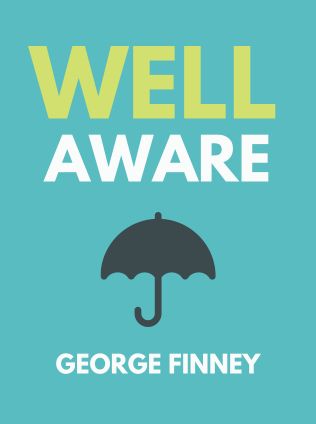
Well Aware
Master the Nine Cybersecurity Habits to Protect Your Future
By George Finney
Published 10/2020
About the Author
George Finney is the Chief Security Officer (CSO) for Southern Methodist University (SMU) in Dallas, Texas. He is a seasoned cybersecurity professional with a unique approach to addressing cybersecurity challenges. Finney emphasizes the importance of human elements in cybersecurity, advocating that people are the key to solving cybersecurity issues. His passion for education is evident through his teaching roles at SMU, where he has educated students on cybersecurity topics.
Finney is also an attorney and holds several prestigious certifications, including Certified Information Privacy Professional (CIPP) and Certified Information Security Systems Professional (CISSP). His extensive experience and deep understanding of cybersecurity make him a respected voice in the field. He has authored several books on cybersecurity, with Well Aware: Master the Nine Cybersecurity Habits to Protect Your Future being a notable contribution that provides valuable insights into creating a comprehensive approach to cybersecurity.
Main Idea
The central theme of Well Aware revolves around the nine cybersecurity habits that are essential for protecting oneself, organizations, and communities from cyber threats. Finney argues that cybersecurity is not merely a technological issue but fundamentally a people issue. By developing and mastering these nine habits, individuals and organizations can build a robust defense against cyber attacks and create a culture of security awareness.
The book outlines a holistic approach to cybersecurity that integrates literacy, skepticism, vigilance, secrecy, culture, diligence, community, mirroring, and deception. Each habit builds on the previous one, forming a comprehensive shield that can adapt to the evolving landscape of cyber threats. The emphasis is on proactive behavior, continuous learning, and the importance of community in achieving security.
Table of Contents
- Introduction
- Literacy
- Skepticism
- Vigilance
- Secrecy
- Culture
- Diligence
- Community
- Mirroring
- Deception
- Conclusion
Analyzing and Explaining Each Idea and Sub-Content in Depth
Introduction
In the introduction, Finney sets the stage by challenging the common perception of cybersecurity as a purely technological problem. He emphasizes that effective cybersecurity requires a combination of technical solutions and human behavior. The introduction highlights the importance of understanding the environment and continuously learning to stay ahead of cyber threats. Finney introduces the concept of the nine cybersecurity habits that will be explored in depth throughout the book.
Literacy
Cybersecurity literacy is the foundation of effective security. It involves understanding the environment, recognizing potential threats, and making informed decisions. Finney argues that just as literacy involves recognizing words and understanding their meaning, cybersecurity literacy involves recognizing potential threats and knowing how to respond. This habit requires continuous learning and staying updated with the latest security trends and practices.
"If being literate means recognizing the words on the page, then having cybersecurity literacy means recognizing potential threats." – George Finney
cybersecurity literacy include:
- Understanding how to set privacy settings on social media platforms
- Knowing the types of scams and phishing attempts to be aware of
- Being able to troubleshoot and configure security features on personal devices
Skepticism
Skepticism is the habit of questioning and verifying information before trusting it. In the context of cybersecurity, this means not taking anything at face value and always verifying the credibility of sources. Finney likens this to the mindset of residents of Missouri, the "Show Me State," who require evidence before believing something.
"Being a skeptic means not trusting something until you’ve established its credibility, which also requires patience." – George Finney
Practical applications of skepticism include:
- Verifying the authenticity of emails before clicking on links or downloading attachments
- Double-checking the legitimacy of websites before entering personal information
- Being cautious of unsolicited offers or requests for sensitive information
Vigilance
Vigilance is about maintaining a state of readiness to recognize and act on potential threats. It is a directed form of skepticism that focuses on monitoring and detecting specific threats. Finney explains that vigilance requires continuous monitoring and the ability to respond quickly to incidents.
"Vigilance is a state of mind that’s about keeping watch so that when you see something, you are ready to recognize it and act." – George Finney
vigilance in practice include:
- Regularly reviewing server logs and access records
- Setting up alerts for unusual activities on critical systems
- Conducting regular security audits and assessments
Secrecy
Secrecy involves creating barriers between what is public and what is private. It is a fundamental aspect of cybersecurity, as it dictates the controls needed to protect sensitive information. Finney discusses the importance of balancing secrecy with the need for collaboration and productivity within an organization.
"Secrecy is the natural barrier between that which is public and that which is private." – George Finney
Applications of secrecy include:
- Classifying information based on its sensitivity and implementing appropriate access controls
- Using encryption to protect data in transit and at rest
- Establishing policies for handling and sharing sensitive information
Culture
Cybersecurity culture is an essential part of an organization’s overall culture. Finney emphasizes that security controls alone are not enough; the entire organization must embrace a culture of cybersecurity. This means that security should be integrated into everyday practices and supported by all levels of the organization.
"A culture of cybersecurity embraced at all levels of a company, government, or community is needed." – George Finney
Building a strong cybersecurity culture involves:
Sign up for FREE and get access to 1,400+ books summaries.
You May Also Like
The Subtle Art of Not Giving a F*ck
A Counterintuitive Approach to Living a Good Life
By Mark MansonRich Dad Poor Dad
What the Rich Teach Their Kids About Money - That the Poor and Middle Class Do Not!
By Robert T. KiyosakiHow To Win Friends and Influence People
The All-Time Classic Manual Of People Skills
By Dale Carnegie



















